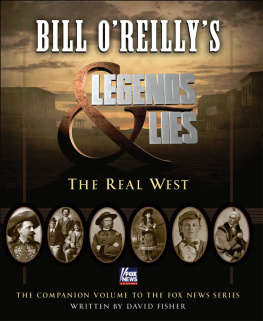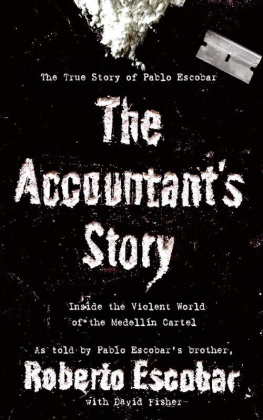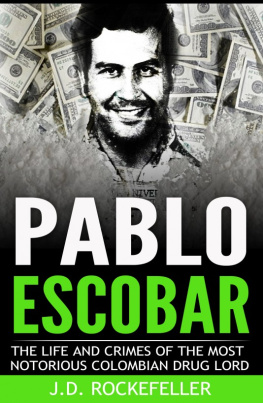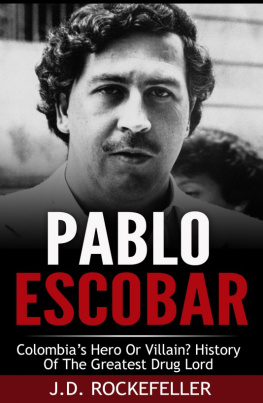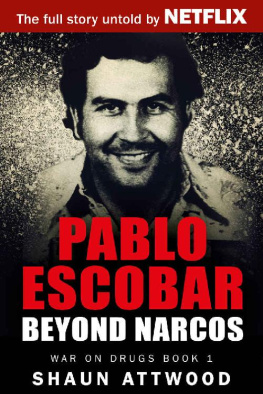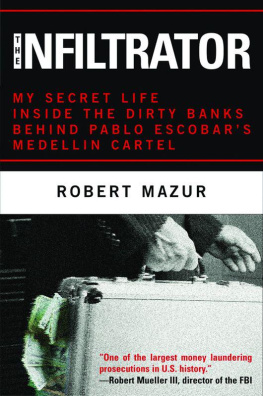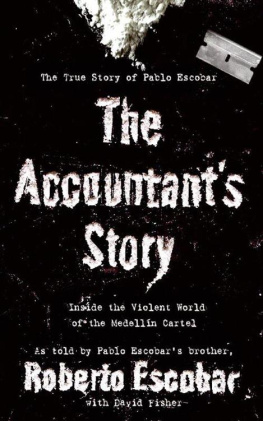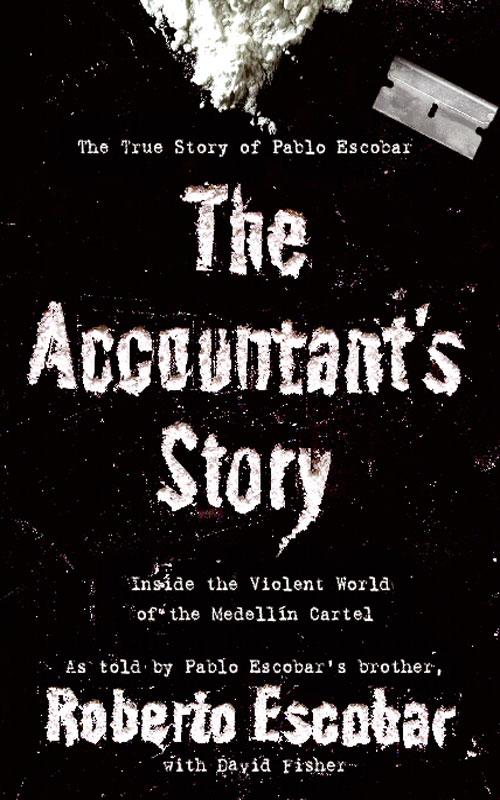Due to the sensitive nature of the material disclosed in this book, some names and identifying characteristics have been changed.
Copyright 2009 by Roberto Escobar and David Fisher
All rights reserved. Except as permitted under the U.S. Copyright Act of 1976, no part of this publication may be reproduced, distributed, or transmitted in any form or by any means, or stored in a database or retrieval system, without the prior written permission of the publisher.
Grand Central Publishing
Hachette Book Group
237 Park Avenue
New York, NY 10017
Visit our Web site at www.HachetteBookGroup.com.
First eBook Edition: February 2009
Grand Central Publishing is a division of Hachette Book Group, Inc.
The Grand Central Publishing name and logo is a trademark of Hachette Book Group, Inc.
ISBN: 978-0-446-54369-9
I dedicate this book to God Almighty, as gratitude and to the memory of three extraordinary people: my mother, Hermilda, dedicated to a life of social service as a teacher and a role model citizen in the community; my father, Abel, a good man who showed me the rewards earned by hard work and the values of fighting for what you believe; and finally my brother, Pablo, a good soul with a vision for the future that turned the impossible to possible, who planted in his heart a place for the poor and unprotectedand whose memory today is part of history.
ROBERTO ESCOBAR
October 2008
In our world of instant communications it has become relatively simple to become a legend. To be anointed a person has to perform a feat mammoth enough to earn the covers of all the celebrity magazines the same week and dominate twenty-four-hour coverage on cable news for at least several news cycles. One of these nouveau legends can emerge instantly from any field: politics, entertainment, sports, crime, and the bizarre. But in our eat-em-up media yesterdays legends rapidly become tomorrows Dancing with the Stars contestants.
But Pablo Escobar became a legend the old-fashioned way: He shot his way to the top of the charts. True legends, like that of Pablo Escobar, grow slowly through time and must be nurtured. The stories told about them have to continue to grow in scope and size until reality is simply too small to contain them. They have to burst beyond the borders of time and place and become famous enough to outlive the contemporary journalism of their life. The world has to come to know them on a first-name basis.
Pablo Escobar has joined the list of celebrity criminals, finding his place on the dark side of history with Blackbeard, Jesse James, and Al Capone. Movies about his life will be made, more in an effort to exploit him than explain him. Pablo Escobar gained infamy as the most successful, most ruthless, and certainly the best known drug trafficker in history, a man who was beloved by the poorest people of Colombia while being despised by the leaders of nations. He has become known as the richest outlaw in history, a man who built neighborhoods while destroying lives, a multibillionaire who was able to evade the armies searching years for him. When I began working on this project I knew very little about Pablo Escobar other than the broad facts that emerged above the clatter: He had become synonymous with Colombian cocaine, which had flooded the United States, and as a result he was listed as one of Forbes magazines ten richest men in the world.
Before beginning my long series of interviews with Pablos surviving brother, Roberto, I did considerable background research, most of which confirmed what I knew and filled in substantial details. The facts of Pablo Escobars life are the bricks of legend: Born in 1949 during a period of tremendous violence that resulted in the deaths of tens of thousands of Colombians, he grew up in a lower-middle-class working family. By the early 1970s he had become involved in his first serious crimes, and by the late 1970s he had entered the world of drug trafficking. His genius for organizing enabled him to bring together other traffickers to form what became the Medelln cartel. This came at the perfect time, when affluent Americans fell in love with cocaine. It was Pablo Escobars cartel that supplied Americas habit, and even the countless thousands of tons of coke that were successfully smuggled into America werent enough to satisfy the demand. Pablo revolutionized the drug trade by creating new methods to smuggle massive amounts of drugs into America and then Europe. The business made Pablo and his partners billionaires. Pablo used many millions of his dollars to aid the poorest people of Colombia, building homes, buying food and medicine, paying school tuition, and in so many different ways becoming their hero.
Meanwhile, his greatest fear, the greatest fear of all the traffickers, was that Colombia would enforce its extradition treaty with the United States and they would end up in an American prison.
In 1982 Pablo entered politics and was elected as an alternate to Congress; perhaps to serve the lower classes of his country as he claimed or perhaps to insulate himself from extradition as an elected official. Although Pablo claimed his money had been earned in real estate, in 1983 Minister of Justice Rodrigo Lara Bonilla accused him of being a drug dealer; for the first time the rumors had become public. When Lara Bonilla was killed in April 1984, Pablo was blamed and his political career ended.
For the first time the extraordinary violence for which the Medelln cartel would become known became part of Colombias daily life; in 1985 almost 1,700 people were murdered in Medelln, a figure that would continue to grow. Pablo and the leaders of the cartel were forced into hiding for the next few years, at times spending months in the jungles, often escaping just minutes ahead of government forces. In November of 1985 rebels launched a massive attack on the Palace of Justice; hundreds of people died, among them justices of the Supreme Court. Pablo was accused of financing the attack in an effort to destroy all the evidence the government had collected against him, which was stored there. This attack on the government truly shocked Colombia, and people all over the world began learning the name Pablo Escobar.
In 1988 the rival Cali cartel also declared war on Medelln by bombing Pablos houses. The killings throughout Colombia increased; at night the streets of the large cities were deserted. And still the flood of drugs into America continued growing. Pablo and his close associates, including his brother, Roberto, successfully managed to evade the enemies searching the country for them while he led his private army in battle. But one by one other leaders of the cartel were captured or killed.
By 1989 government officials were being killed and bombs were exploding in the big cities of the nation almost on a daily basis. But the civilized world was stunned once again when a commercial airliner, Avianca flight HK 1803, was bombed and all 107 passengers died. Pablo was blamed for this, adding to his growing reputation as one of historys most brutal criminals. A week later the headquarters of DAS, Colombias FBI, was destroyed by a massive bomb; 89 people died. The Colombian governments war against Pablo Escobar was joined by American Special Ops teams.
Pablo retaliated by targeting police officers, and within a few months more than 250 policemen were killed. In 1991 the government finally outlawed the extradition treaty, and Pablo, Roberto, and a dozen other men surrendered and were housed in a prison that Pablo built and controlled, a prison known as the Cathedral.
In July 1992, the government attempted to invade the prison and capture the prisoners. While officially it was explained that Pablo was to be moved to a more strict prison, he believed this was an attempt to extradite him to America. Before he could be taken, he escaped into the jungles and the inner cities of Colombia, and the killing began once again.


